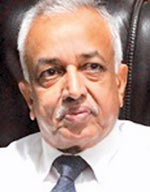Sri Lanka to sign ETCA with India by end 2016

Minister of Development Strategies and International Trade Malik Samarawickrama
The Government is set to sign the Economic and Technology Cooperation Agreement (ETCA) with India, which has triggered a major controversy from professional groups, by end this year with a working draft prepared by Sri Lanka to be discussed with an Indian trade delegation due here in the next fortnight, it was officially announced on Tuesday. Minister of Development Strategies and International Trade Malik Samarawickrama told a media conference that the Free Trade Agreement (FTA) with Singapore will also be signed this year while the China FTA will be signed next year. The national policy is likely to be presented in Parliament by the end of August.
He said that for first time in Sri Lanka, the government is consulting all chambers of commerce and professional bodies on these trade and investment accords. “The government will not allow the entry of foreign professionals except in special cases, as it is the case now under the Board of Investment rules,”he emphasised. India and China will be set up Special Economic Zones in Sri Lanka to start industries, he said adding that “Indians will be setting up pharmaceutical and auto parts industries in their zone. The Chinese have asked for 55 sq km (15,000 acres) of land in the Hambantota area in the Southern Province for their zone, and we are in the process of acquiring the land.
When developed, this area will generate one million jobs. The location for the Indian SEZ is yet to be finalised.” ”Next week the Chinese delegation will be here to start talks on the Free Trade Agreement,” he said adding that, “the week after that the Indian delegation will be here and towards end-August the Singapore delegation will be here.” The FTA with Pakistan provides an opportunity for Indian investors to access that market on a preferential basis by locating in Sri Lanka. Intuitively, there will be possibilities to re-direct some of the Indo-Pakistan trade currently transiting through Dubai, he revealed.
These agreements will give companies located in Sri Lanka preferential access to a market of around three billion people, he pointed out.
To make the MPs representing various political parties aware on the whole process and obtain their views on the trade agreements, action has been taken to set up a Parliamentary Working Committee. The EU GSP + will be restored in about six months and a separate agreement will now have to be reached with the UK as Brexit looms over the island, he disclosed. He has also made an announcement on the establishment of the Agency for International Trade consisting of 11 experts of repute headed by renowned economist Dr. Saman Kelegama which was not much publicised.
Members of this agency have met on a weekly basis for the last several months and deliberated on matters pertaining to international trade and bilateral trade agreements and have developed valuable insights and positions that Sri Lanka should make use during negotiations, Advisor of the Agency, former Director General of the Department of Commerce K.J .Weerasinghe revealed. The scope and the basis for negotiations on the comprehensive trade agreements have been formulated, he said. Faizer Mustapha, Minister of Local Government also attended the media conference but his presence in the briefing of country’s trade agreements was not explained thus arousing the curiosity of some of the journalists.
However Minister Mustapha, a close ally of President Maithripala Sirisena, noted that the President had directed him to tell the media the government will not sign any agreement which goes against Sri Lanka’s security and national interests. He noted that it is essential to enter into trade and investment accords with various countries as these are necessary for economic growth of the country. ”All countries are friendly to Sri Lanka now. That gives us a good platform to negotiate good deals. Foreign investments hinge on political relations,” he added. He pointed out that there were no political differences or any reservations in the national government on trade agreements with foreign countries.


